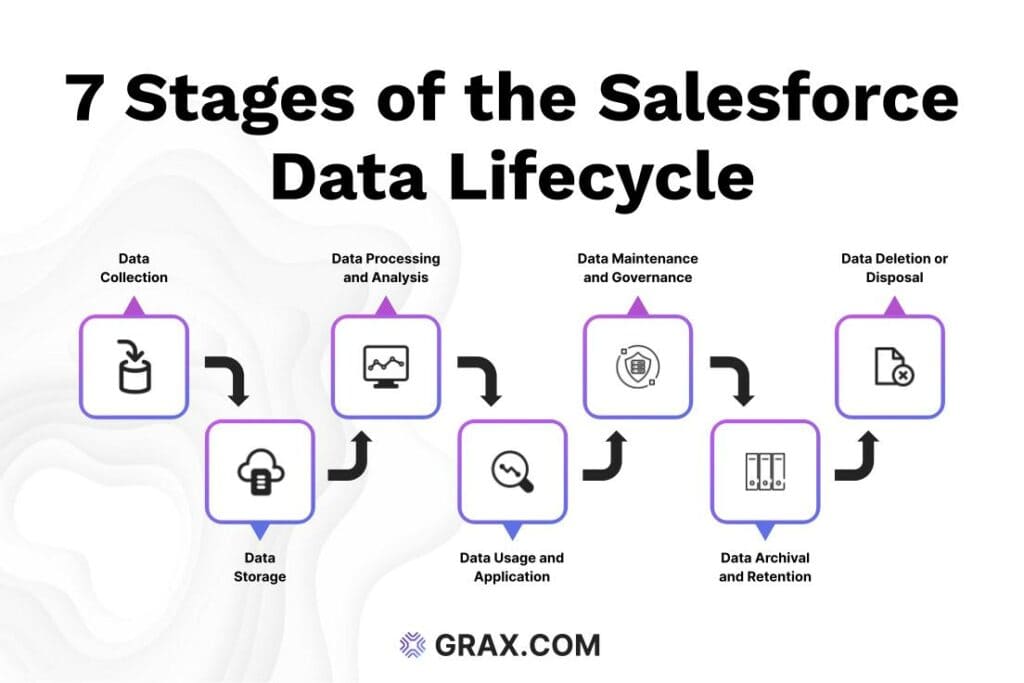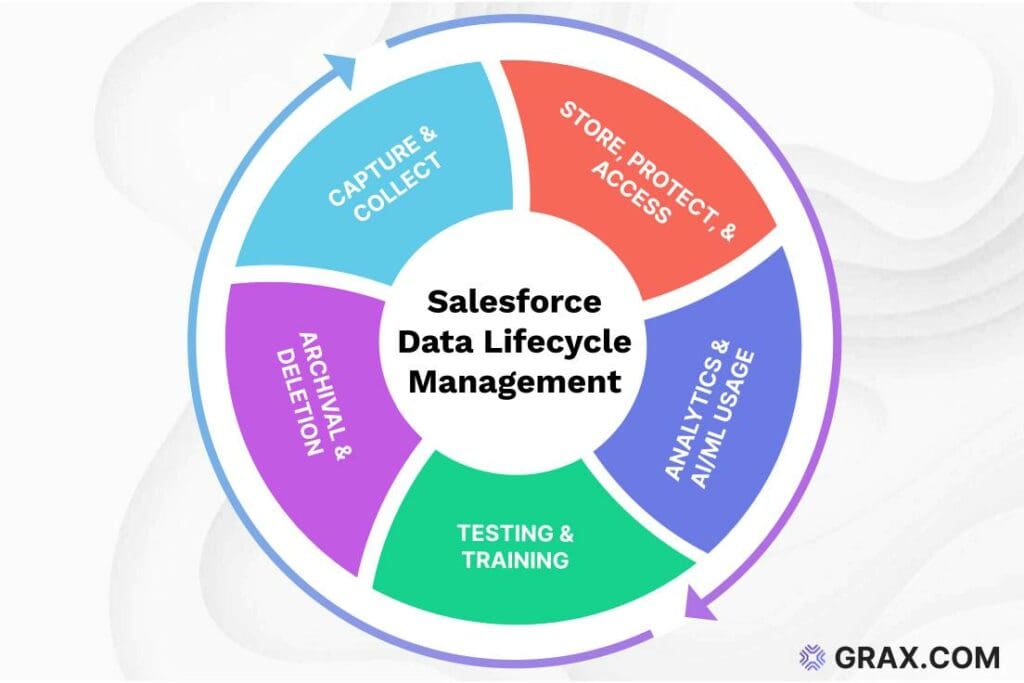GRAX’s new lifecycle management feature for the Salesforce platform makes implementing and managing data retention policies easier than ever.

What is Salesforce Data Lifecycle Management?
Salesforce data lifecycle management can be defined as the comprehensive approach to managing data from the Salesforce platform, encompassing various stages of the data’s lifecycle. Although stages can vary from organization to organization and industry to industry, these are the most common phases found as part of the Salesforce data lifecycle:
- Data Collection – This stage involves gathering and capturing data from Salesforce
- Data Storage – Data is stored and easily accessible in databases, data warehouses, or cloud storage systems
- Data Processing and Analysis – Data is prepared for downstream consumption and analyzed to extract insights, identify patterns, and make informed business decisions
- Data Usage and Application – Data is utilized in various applications, systems, or business processes to drive operations, improve decision-making, and enable innovation.
- Data Maintenance and Governance – Data needs to be continuously maintained, updated, and monitored to ensure accuracy, consistency, and compliance with regulations and internal policies
- Data Archival and Retention – Salesforce data archiving occurs, or data is retained for historical, legal, or compliance purposes
- Data Deletion or Disposal – At the end of the data’s lifecycle – when it’s no longer needed, data is securely deleted or disposed of according to data retention policies and legal requirements
Data lifecycle management involves the implementation of effective strategies, workflows, and tools to ensure data quality, compliance, security, and accessibility throughout the data’s journey. From the moment data is created or captured from Salesforce to its eventual disposal, data lifecycle management focuses on maintaining data integrity and maximizing its value.
Imagine a world where valuable insights, the gems of knowledge hidden within our data, are lost amidst the chaos of unmanaged data. Picture the missed opportunities, the untapped potential that slips through the cracks when we lack a structured approach to managing customer data.
But it doesn’t have to be that way. GRAX Lifecycle Management empowers users to take control and breathe life into their data and unleash its incredible capabilities.
Joe Gaska, Head of Product @ GRAX
Why it matters
Data is the lifeblood of modern organizations, fueling critical business decision-making, customer experiences, business intelligence, and strategic initiatives. However, without a well-structured approach to data lifecycle management, valuable insights can get buried and risk incurring penalties for non-compliance with data retention regulations.
In fact, violations of data retention policies can be costly and will vary depending on the specific regulation, jurisdiction, and severity of the violation. For example:
- General Data Protection Regulation (GDPR): Non-compliance with GDPR can lead to significant fines, which can be up to €20 million or 4% of the global annual revenue of the violating organization, whichever is higher.
- California Consumer Privacy Act (CCPA): CCPA provides a private right of action for consumers in case of data breaches. If a business fails to implement and maintain reasonable security practices, it may face penalties of up to $7,500 per violation.
- Health Insurance Portability and Accountability Act (HIPAA): HIPAA violations can result in substantial penalties, ranging from $100 to $50,000 per violation. The exact amount depends on the level of negligence and the extent of the violation.
- Payment Card Industry Data Security Standard (PCI DSS): Non-compliance with PCI DSS can lead to varied fines imposed by payment card brands or acquiring banks. These fines can vary depending on the number of violations and the severity of non-compliance.
- Sarbanes-Oxley Act (SOX): SOX violations can result in civil penalties, criminal charges, and imprisonment. The exact fines and penalties depend on the nature and severity of the violation.
With all the various compliance and regulations being introduced state by state and by country, data retention policies have become a more critical component of data management systems.
Try GRAX Lifecycle Management for free
What it includes
GRAX Lifecycle Management is included as part of our Data Archive offering since lifecycle policies are a key part of an organization’s overall archiving strategy. This product will enable users to define and enforce data retention policies based on regulatory requirements or internal business needs, and also features:
- Data Retention Policies – Enables organizations to automatically set up and manage the lifecycle of data, including retention periods, archival, and eventual deletion based on standard object date criteria.
- GRAX Search and Delete API – Allows for even finer and granular control to search, filter, and delete types of data based on any custom needs.
- GRAX Record Lock – Locks any record, retaining the data, which prevents any deletion from the API, user interface, or from preset data retention policies.
- GRAX Delete Forever Log – Easily export hard delete logs for auditability
With these features, GRAX Lifecycle Management helps complete the Salesforce data lifecycle from backup and data capture through archival and deletion by simply creating a data retention policy.

Who it benefits and impacts
GRAX Lifecycle Management benefits all organizations using Salesforce by providing a comprehensive solution for managing their data lifecycle. This solution empowers businesses to define and enforce data retention policies based on regulatory requirements or internal business needs, which ensures compliance with data retention regulations and facilitates effective data management throughout its lifecycle.
- Compliance Teams – Establish and maintain data retention policies in alignment with regulatory requirements. This product enables them to easily set up retention periods, archival processes, and eventual deletion of data based on standard object date criteria. This ensures that the organization remains compliant with relevant regulations and reduces the risk of non-compliance penalties.
- Data Managers and Data Administrators – Streamline the Salesforce data management process with ease. This product’s features provide finer control and visibility over CRM data, which simplifies the management of data retention, archival, and deletion processes, leading to increased operational efficiency.
- Legal and Governance Teams – Audit and report on data deletion activities, which helps with compliance monitoring, internal governance, and demonstrating adherence to data retention policies.
GRAX Lifecycle Management is purpose-built to be beneficial to all organizations working with customer data stored in Salesforce.
Learn more
- Try out GRAX Data Archive & Lifecycle Policies for free by signing up here.
- Speak with a GRAX product expert to see how our solution can help your organization here.
—
GRAX Lifecycle Management is generally available soon. Any unreleased services or features referenced in this or other press releases, public statements, or public materials are not currently generally available and may not be delivered on time or at all. Customers who purchase GRAX should make their purchase decisions based on currently available features.




